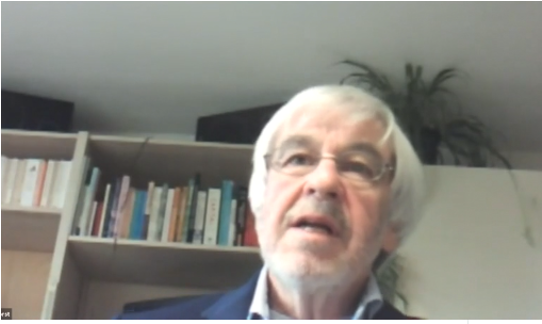The webinar on 'Achieving Fair Prices and Living incomes in Global value Chains through Public Policies in Europe' was organised by the Fair Trade Advocacy Office in Brussels in cooperation with the Sustainable Food Lab, GIZ, and with financial support from the German Federal Ministry for Economic Cooperation and Development.
Ruud Bronkhorst started with the statement “No Fair Prices, no Living Wages”. Then he explained why fair prices are essential, by referring to a) the Universal of Human Rights and b) to the global problem of climate change. Within the first it was referred to Article 23 and 25 of the Declaration of Universal Human Rights, in particular.
Article 23
“Everyone who works has the right to just and favourable remuneration ensuring for himself and his family an existence worthy of human dignity...”
Article 25
“Everyone has the right to a standard of living adequate for the health and well-being of himself and of his family, including food, clothing, housing and medical care and necessary social services...”
Moreover, Ruud Bronkhorst referred to the UN Agenda for Sustainable Development and the sustainable development goals 1 (‘No Poverty’) and 2 (‘Zero Hunger’). The concepts of Living Wage and Living Income, that are derived from this Human Rights Declaration, are about the remuneration of workers that must be sufficient to afford a decent standard of living.
Additionally, Fair prices should also be regarded in the light of Climate change and its effects. According to Ruud Bronkhorst this is especially important because poor countries are worst off when it comes to weather related events. Especially farmers in poor countries are hard hit and need additional funds to mitigate the effects. Therefore, an additional percentage should be included in the Living Income definition to enable small farmers to pay for those investments and invest in preparation for the climate change.
Those international legal obligations show the importance of the payment of Fair Prices for the EU and its Member States.
Definition of Fair Price: “A ‘Fair’ Price is the minimum price the producer should receive to cover all production costs (fixed and variable costs) and be able to pay Fair Wages to all his/her workers on this product and him/herself. It should also allow the producer to make necessary investments. In the case of agriculture, it should provide at least a ‘Living Income’ for the farmer”.
Ruud Bronkhorst stressed that the payment of fair prices may lead to higher consumer prices, but not necessarily so. He mentioned the importance of removing blockages in the chain and showed with an example how with a different way of calculation in the production chain, namely with fixed amounts instead of percentages, the rise in consumer prices can be diminished.
Then Ruud Bronkhorst focused on how to achieve Fair Prices. He made clear that in order to achieve Fair Prices, we need the political will to put a legal system of fair prices into place.
Socio-economic effects of the payment of Fair prices and wages were discussed, on poverty, child labour, local and regional economic development, climate and migration.
Laying out possible actions for the EU and its Member States, he referred to the following options.
First, to introduce legislation to make companies responsible for application Universal Human Rights by payment of Fair Prices and Wages in the whole chain. Secondly, analysing the production chain for blockages. Thirdly, he mentioned the need to modify the current EU antitrust rules as they are perceived as a burden for companies to agree to pay fair wages and prices. He referred to the so called ‘first-mover disadvantage’ that companies often face when moving towards paying a living wage or income alone. Companies must be enabled to come together to do so. Fourth, producer countries must be supported in their legislation and negotiations with third parties such as WTO. And last, it was said that direct support to voluntary organisation of farmers and workers must be provided.
More can be read in the book “The Economics of Human Rights, Using the Living Income/ Fair Price Approach to Combat Poverty” here.
The presentation of Ruud Bronkhorst at the webinar can be found here.
Information on the webinar, agenda and presenters, and recordings of the presentations can be found here.


